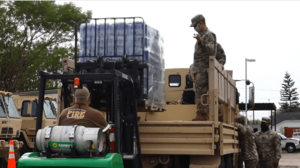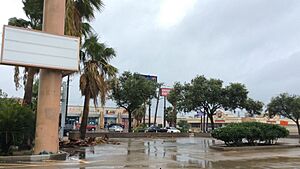Hurricane Hanna (2020) facts for kids
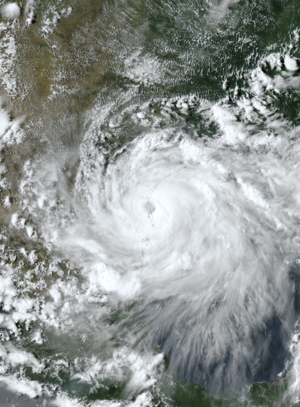
Hanna at its strongest point, hitting Texas on July 25
|
|
| Meteorological history | |
|---|---|
| Formed | July 23, 2020 |
| Dissipated | July 26, 2020 |
| Category 1 tropical cyclone | |
| 1-minute sustained (SSHWS/NWS) | |
| Highest winds | 90 mph (150 km/h) |
| Lowest pressure | 973 mbar (hPa); 28.73 inHg |
| Overall effects | |
| Fatalities | 9 |
| Damage | $1.2 billion (2020 USD) |
| Areas affected | Cuba, Hispaniola, Gulf Coast of the United States (mainly Texas), Mexico |
|
Part of the 2020 Atlantic hurricane season |
|
Hurricane Hanna was a powerful storm that hit the United States in 2020. It was the first hurricane of that year's very active Atlantic hurricane season. Hanna formed from a weather disturbance near Hispaniola. It brought heavy rain to Hispaniola, Cuba, and Florida. The storm then grew stronger in the Gulf of Mexico. It became a tropical storm on July 24, setting a new record for how early a storm got its name. Hanna continued to strengthen as it moved towards Southern Texas. It became a hurricane on July 25. Later that day, it made landfall in Texas as a strong Category 1 hurricane. It had winds of 90 mph (140 km/h). Hanna quickly weakened after moving inland and disappeared over Mexico on July 26.
In Florida, one person died due to strong ocean currents caused by the storm's early stages. Hanna's rainbands also brought thunderstorms to the Northern Gulf Coast. The storm dropped a lot of rain, up to 18 inches (460 mm), in parts of Southern Texas and Mexico. Over 50,000 people lost electricity. Hurricane Hanna caused damage to buildings and knocked down power lines. In Texas, especially in the Rio Grande Valley, there was a lot of property damage. Areas south of Corpus Christi saw the worst of the storm. Corpus Christi itself had flooding from storm surge and strong winds. In Mexico, severe flooding led to four people losing their lives. Overall, Hurricane Hanna caused at least $1.2 billion in damage.
Contents
How Hanna Formed and Moved
A weather disturbance, like a big cloud system, started near the west coast of Africa on July 11, 2020. It moved across the Atlantic Ocean. At first, it did not grow much because of dry air. As it passed near the Virgin Islands and Puerto Rico, forecasters started watching it.
From Tropical Wave to Hurricane
The disturbance moved into the southeastern Gulf of Mexico. Here, the conditions became better for it to grow. On July 23, it became a tropical depression. This means it had a closed center of circulation. It was named Tropical Storm Hanna on July 24. This was the earliest an eighth storm had been named in the Atlantic season. Hanna kept getting stronger as it moved towards Texas. On July 25, it officially became a hurricane.
Landfall and Weakening
Hanna continued to strengthen even as it got close to land. It developed a clear "eye," which is the calm center of a hurricane. The storm reached its strongest point with winds of 90 mph (140 km/h). Hanna made landfall on Padre Island, Texas, on July 25. It then moved over the Laguna Madre and made a second landfall in Kenedy County, Texas. After moving inland, Hanna quickly lost power. It became a tropical storm by July 26. Later that day, it weakened into a tropical depression over Northeastern Mexico. Hanna finally disappeared over the mountainous terrain by July 27.
Getting Ready for the Storm
People and officials started preparing for Hanna early. The National Weather Service issued warnings for the Texas coast. These warnings told people about possible tropical storms and hurricanes.
Warnings and Evacuations
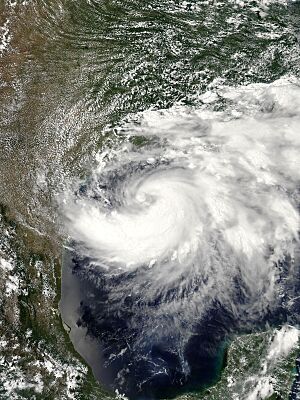
The Texas Division of Emergency Management (TDEM) helped organize state agencies. They prepared search-and-rescue teams and aircraft. The United States Coast Guard told sailors to move their boats to safety. Beaches and parks along the Nueces Bay and the Gulf of Mexico were closed. Colleges also limited their activities.
Hanna arrived during the COVID-19 pandemic. This made preparations more difficult. Some COVID-19 testing sites had to close. Bus services were cancelled for two days. The Port of Corpus Christi closed to ships. Most flights from Corpus Christi International Airport were cancelled.
Community Efforts
Local leaders declared states of disaster in several counties. This helped them get resources to prepare. Many towns gave out sandbags to help prevent flooding. Officials in some areas, like Port Mansfield, suggested people leave their homes. Voluntary evacuation orders were given for other vulnerable areas.
Shelters were opened for people who needed to leave. The Texas National Guard helped test evacuees for COVID-19. These preparations helped keep people safe during the storm.
Hanna's Impact
Hurricane Hanna caused significant damage and disruption. It affected Texas, Mexico, and other nearby areas.
Effects in Texas
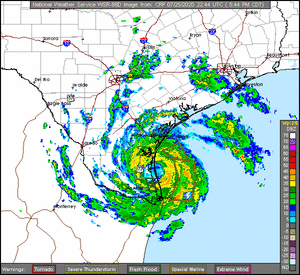
In Texas, about 194,000 homes and businesses lost electricity. Hanna brought heavy rain, causing widespread flash flooding. Strong winds tore roofs from homes and knocked down trees. Wind gusts reached up to 110 mph (180 km/h). The storm surge, which is rising ocean water pushed by the storm, reached over 6.24 ft (1.90 m).
The Bob Hall Pier in Corpus Christi was badly damaged and partly collapsed. The Art Museum of South Texas and outdoor exhibits at the Texas State Aquarium also experienced flooding. Many streets and highways became impassable due to water. Hanna caused about $176.6 million in crop damage. In Port Mansfield, 40% of homes had serious structural damage. Some cities, like Mission and McAllen, experienced severe flooding. Five small EF0 tornadoes also touched down, causing minor damage. Economic losses in Texas were estimated at over US$775 million.
Effects in Mexico
On July 26, Hanna moved into Mexico as a tropical storm. Streets in Monterrey were flooded. Large parts of Nuevo León, Coahuila, and Tamaulipas states lost electricity. A road connecting Monterrey to Reynosa was closed due to flooding. In Matamoros, heavy rain and winds damaged tents in a camp for people seeking safety.
Reynosa was one of the most affected cities. Two people lost their lives there, and 200 people had to leave their homes. A maternity hospital was flooded. An 11-year-old child was reported missing during the floods in Monterrey. A woman and her daughter also died in Ramos Arizpe. Total economic losses in Mexico were at least US$100 million.
Other Areas Affected
Before becoming a hurricane, Hanna's early disturbance brought heavy rain to parts of Hispaniola, the Florida Keys and Cuba. In Pensacola, Florida, one person died due to strong ocean currents. Hanna's outer bands also brought heavy rainfall to parts of Louisiana, Mississippi, Alabama, and the Florida Panhandle.
After the Storm Passed
After Hurricane Hanna moved away, recovery efforts began.
Recovery in Texas
Texas Governor Greg Abbott declared a disaster for 32 counties. This helped them get federal aid. The Federal Emergency Management Agency (FEMA) provided support for emergency measures. This included help with evacuations and shelters. Governor Abbott visited Corpus Christi and praised the preparations. He noted that no lives were lost in Texas directly from the storm.
There was talk of federal funds to repair the Bob Hall Pier. However, as of January 2021, the county had not received FEMA funding for the pier's repair.
Recovery in Mexico
In Mexico, people worked to restore power and clear flooded roads. Aid was provided to affected communities.
See also
 In Spanish: Huracán Hanna (2020) para niños
In Spanish: Huracán Hanna (2020) para niños
- Tropical cyclones in 2020
- Other storms of the same name
- List of Category 1 Atlantic hurricanes
- Hurricane Bret (1999) – A Category 4 hurricane that impacted similar areas
- Hurricane Claudette (2003) – A Category 1 hurricane that also impacted South Texas
- Hurricane Erika (2003) – A Category 1 hurricane that took a similar path
- Hurricane Dolly (2008) – A Category 2 hurricane that made landfall in a similar location at a similar strength
 | Chris Smalls |
 | Fred Hampton |
 | Ralph Abernathy |


